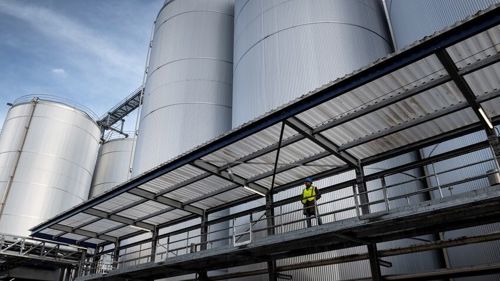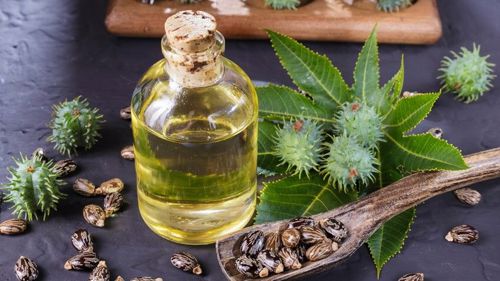
Meet the wonder oil: castor oil
It’s called wonder oil. Castor oil, also known as ricinus communis oil, is used in anything from lubricants for high-speed trains, tunnel boring, airplanes and washing liquid detergents to ski boots, PVC additives, high performance sport shoe soles, cosmetics, adhesives, coatings, paints and even as an emulsifier in the chocolate industry.

Castor oil is a vegetable oil made from castor beans, which are not edible and can grow on semi-arid and arid land unsuitable for many other crops. The beans are hand-picked on largely smallholder farms of 1-3 hectares, and India currently accounts for close to 90% of worldwide exports. The vegetable oil is unique for its chemical properties and structure and the crop does not compete with food products. As a result, scientists continue to focus on finding new products and applications based on this feedstock.
Within the next 10 years, countries like Brazil and Mexico could become large castor bean growers and processors with mechanical harvesting solutions and crushing capacities. This expansion of castor bean production is to be welcomed, as demand for castor oil and its downstream products will continue to amplify in the next decades.
“It’s amazing. Every day when I wake up, I ask myself what’s going to happen today? What new challenges and opportunities will come up? The daily business can vary a lot and that makes it fascinating to work in,” says Denis Ginter, Head of Technical Oils for COFCO International, and who was recently elected President of the International Castor Oil Association (ICOA).
“We obviously have our processes, but it’s not too repetitive as there are always variations. Even after 22 years in this business I still find it really exciting. In fact, I feel a real personal connection to this renewable resource and to the continuous growing interest from the chemical industry. I love building relationships with new clients and developing new projects with current and potential customers.”

Unique commodity
A significant advantage of castor oil is that it has few substitutes due to its unique chemical properties. High-speed train and airplane components, for example, require a lubricant with exceptional low-temperature viscosity and high-temperature lubrication, among other properties, to reduce wear. Castor oil, due to its exceptionally high content of ricinoleic acid and high viscosity, thanks to the hydrogen bonding present in its hydroxyl group, is the best product for most types of greases.
As a result, demand for castor is inelastic and, in most cases, not influenced by price developments.
“COFCO International’s involvement in castor oil started in 1963 and today we are dealing with all kinds of clients, from large multinationals to small and medium size companies. We have excellent, long-standing relationships with both clients and suppliers, and create a bridge between the production units in India and the industrial users worldwide,” Ginter says.

Addressing sustainability
Increasing consumer awareness of the sustainability of what they are buying is driving greater focus on the issues across supply chains.
Multinationals are keen to work with castor oil because it is considered a renewable resource and sustainable product, given its demand is not a driver for deforestation, it does not require much water for cultivation, is resistant to pests and does not compete with the food supply chain.
The growing involvement of large corporations, with a strong focus on sustainability, in castor oil has helped to mitigate risks related to labour issues. India’s crushers and regulators are also responding to growing sustainability requirements and have stepped up their efforts to ensure responsibly produced castor products.
COFCO International is now a member of Sustainable Castor Association, a not-for-profit organisation that brings together stakeholders from across the industry to improve and promote sustainability of castor oil and its derivatives globally.
“Castor is a unique drought resistant crop. However, before we started working with the farmers, no measures were taken to make it a sustainably produced crop,” says Rajesh Bhatia, Assistant General Manager at Solidaridad.

Despite being drought resistant, there are some concerns with respect to water usage which are heightened by climate change affecting rainfall patterns.
Solidaridad, an international civil society organization which develops solutions to make communities more resilient, is working to support castor farmers in Gujarat - which represents 75-80% of the castor crop in India - to reduce water use and increase yields.
The rising frequency of droughts, due to climate change and erratic rainfall, is a major factor that impacts the yield and productivity of castor across India. Solidaridad has worked with other Sustainable Castor Association members to help train farmers and thus improve water-use efficiency, enhance soil fertility and promote overall good and sustainable agricultural practices.
The enthusiasm and willingness of the farmers to learn new practices has also allowed Solidaridad to underline labour risks, such as child labour and ensure these are not significant risk issues for the supply chain.
“We work together as an association to understand the entire supply chain for castor, with companies as well as with the farmers,” Bhatia says. “The Sustainable Castor Association is a small step in addressing the climate crisis. The key is to meet the rising demand for castor products with a responsible and sustainable mechanism that benefits consumers, producers and the environment.”

